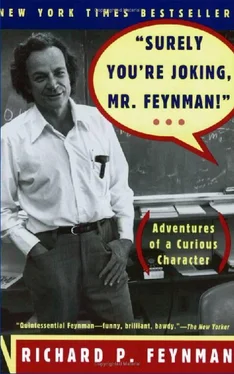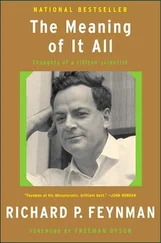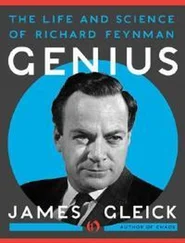Of course I was attacked, from all around. “Don’t you think that order can come from chaos?”
“Uh, well, as a general principle, or … I didn’t understand what to do with a question like “Can order come from chaos?” Yes, no, what of it?
There were a lot of fools at that conference—pompous fools—and pompous fools drive me up the wall. Ordinary fools are all right; you can talk to them, and try to help them out. But pompous fools—guys who are fools and are covering it all over and impressing people as to how wonderful they are with all this hocus pocus—THAT, I CANNOT STAND! An ordinary fool isn’t a faker; an honest fool is all right. But a dishonest fool is terrible! And that’s what I got at the conference, a bunch of pompous fools, and I got very upset. I’m not going to get upset like that again, so I won’t participate in interdisciplinary conferences any more.
A footnote: While I was at the conference, I stayed at the Jewish Theological Seminary, where young rabbis—I think they were Orthodox—were studying. Since I have a Jewish background, I knew of some of the things they told me about the Talmud, but I had never seen the Talmud. It was very interesting. It’s got big pages, and in a little square in the corner of the page is the original Talmud, and then in a sort of L-shaped margin, all around this square, are commentaries written by different people. The Talmud has evolved, and everything has been discussed again and again, all very carefully, in a medieval kind of reasoning. I think the commentaries were shut down around the thirteen— or fourteen— or fifteen-hundreds—there hasn’t been any modern commentary. The Talmud is a wonderful book, a great, big potpourri of things: trivial questions, and difficult questions—for example, problems of teachers, and how to teach—and then some trivia again, and so on. The students told me that the Talmud was never translated, something I thought was curious, since the book is so valuable.
One day, two or three of the young rabbis came to me and said, “We realize that we can’t study to be rabbis in the modern world without knowing something about science, so we’d like to ask you some questions.”
Of course there are thousands of places to find out about science, and Columbia University was right near there, but I wanted to know what kinds of questions they were interested in.
They said, “Well, for instance, is electricity fire?”
“No,” I said, “but… what is the problem?”
They said, “In the Talmud it says you’re not supposed to make fire on a Saturday, so our question is, can we use electrical things on Saturdays?”
I was shocked. They weren’t interested in science at all! The only way science was influencing their lives was so they might be able to interpret better the Talmud! They weren’t interested in the world outside, in natural phenomena; they were only interested in resolving some question brought up in the Talmud.
And then one day—I guess it was a Saturday—I want to go up in the elevator, and there’s a guy standing near the elevator. The elevator comes, I go in, and he goes in with me. I say, “Which floor?” and my hand’s ready to push one of the buttons.
“No, no!” he says, “ I’m supposed to push the buttons for you. ”
“What?”
“Yes! The boys here can’t push the buttons on Saturday, so I have to do it for them. You see, I’m not Jewish, so it’s all right for me to push the buttons. I stand near the elevator, and they tell me what floor, and I push the button for them.”
Well, this really bothered me, so I decided to trap the students in a logical discussion. I had been brought up in a Jewish home, so I knew the kind of nitpicking logic to use, and I thought, “Here’s fun!”
My plan went like this: I’d start off by asking, “Is the Jewish viewpoint a viewpoint that any man can have? Because if it is not, then it’s certainly not something that is truly valuable for humanity … yak, yak, yak.” And then they would have to say, “Yes, the Jewish viewpoint is good for any man.”
Then I would steer them around a little more by asking, “Is it ethical for a man to hire another man to do something which is unethical for him to do? Would you hire a man to rob for you, for instance?” And I keep working them into the channel, very slowly, and very carefully until I’ve got them—trapped!
And do you know what happened? They’re rabbinical students, right? They were ten times better than I was! As soon as they saw I could put them in a hole, they went twist, turn, twist—I can’t remember how—and they were free! I thought I had come up with an original idea—phooey! It had been discussed in the Talmud for ages! So they cleaned me up just as easy as pie—they got right out.
Finally I tried to assure the rabbinical students that the electric spark that was bothering them when they pushed the elevator buttons was not fire. I said, “Electricity is not fire. It’s not a chemical process, as fire is.”
“Oh?” they said.
“Of course, there’s electricity in amongst the atoms in a fire.”
“Aha!” they said.
“And in every other phenomenon that occurs in the world.”
I even proposed a practical solution for eliminating the spark. “If that’s what’s bothering you, you can put a condenser across the switch, so the electricity will go on and off without any spark whatsoever—anywhere.” But for some reason, they didn’t like that idea either.
It really was a disappointment. Here they are, slowly coming to life, only to better interpret the Talmud. Imagine! In modern times like this, guys are studying to go into society and do something—to be a rabbi—and the only way they think that science might be interesting is because their ancient, provincial, medieval problems are being confounded slightly by some new phenomena.
Something else happened at that time which is worth mentioning here. One of the questions the rabbinical students and I discussed at some length was why it is that in academic things, such as theoretical physics, there is a higher proportion of Jewish kids than their proportion in the general population. The rabbinical students thought the reason was that the Jews have a history of respecting learning: They respect their rabbis, who are really teachers, and they respect education. The Jews pass on this tradition in their families all the time, so that if a boy is a good student, it’s as good as, if not better than, being a good football player.
It was the same afternoon that I was reminded how true it is. I was invited to one of the rabbinical students’ home, and he introduced me to his mother, who had just come back from Washington, D.C. She clapped her hands together, in ecstasy, and said, “Oh! My day is complete. Today I met a general, and a professor!”
I realized that there are not many people who think it’s just as important, and just as nice, to meet a professor as to meet a general. So I guess there’s something in what they said.
Judging Books by Their Covers
After the war, physicists were often asked to go to Washington and give advice to various sections of the government, especially the military. What happened, I suppose, is that since the scientists had made these bombs that were so important, the military felt we were useful for something.
Once I was asked to serve on a committee which was to evaluate various weapons for the army, and I wrote a letter back which explained that I was only a theoretical physicist, and I didn’t know anything about weapons for the army.
The army responded that they had found in their experience that theoretical physicists were very useful to them in making decisions, so would I please reconsider?
Читать дальше












